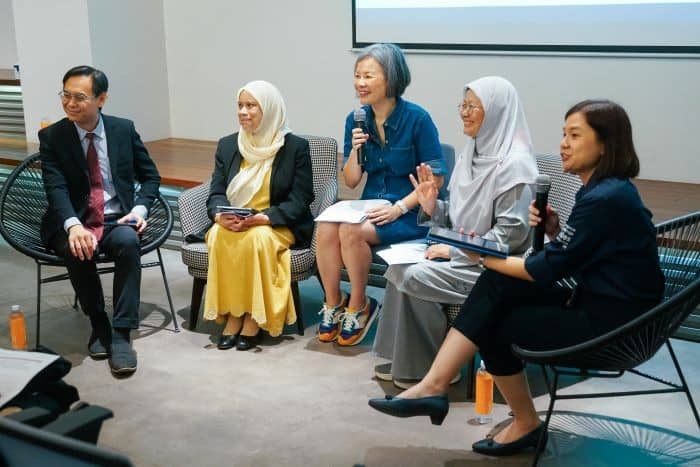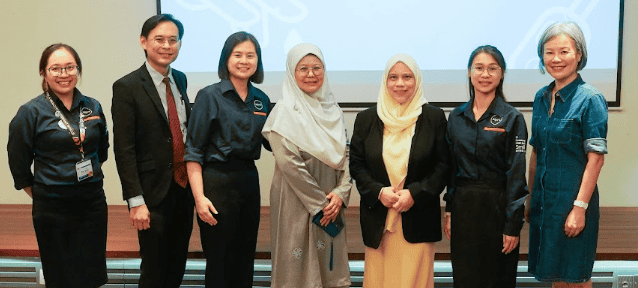
Sugar-coated reality: 84 per cent of Gen Z Malaysians unaware they have diabetes
Diabetes has long been a pressing health issue in Malaysia, with the number of adults living with the condition steadily climbing over the years.
Today, more than 3.6 million Malaysians are diagnosed, but experts say the real figure could be much higher.
A recent study paints a worrying picture: 84 per cent of Malaysians aged 18 to 29 are completely unaware they have diabetes, despite the fact that free screenings are available at most government clinics and hospitals.
Malaysian Health Ministry's Disease Control Division senior assistant director Dr Aizuniza Abdullah said that while diabetes rates saw a slight dip after 2019, the problem is far from solved. “Two in five people do not know they have diabetes,” she explained.
 From left: Dr Chooi, Dr Aizuniza, Ms Theresa Lam, Dt Basmawati and Dt Kai Jia sharing insights and strategies to enhance diabetes care and improve patient outcomes during the panel discussion on "Innovations in Diabetes Care and Management."
From left: Dr Chooi, Dr Aizuniza, Ms Theresa Lam, Dt Basmawati and Dt Kai Jia sharing insights and strategies to enhance diabetes care and improve patient outcomes during the panel discussion on "Innovations in Diabetes Care and Management."
This means a significant portion of the population is living with a condition that can lead to life-threatening complications—complications that, with early intervention, could often be avoided.
What’s even more concerning is the lack of awareness among younger generations. Despite free screening opportunities, many young adults simply aren’t taking advantage of them.
Dr Aizuniza said: “We may start making healthier lifestyle changes now, but if we don’t stress the importance of medical checkups, many young people still don’t realize they have diabetes.”
Early detection is crucial, and right now, it's slipping through the cracks.
The Health Ministry has invested over RM4.4 billion into diabetes care, but Dr Aizuniza reminded that the change won’t happen just through funding or government programmes.
“It starts with the people,” she said.
 From left: Alpro Pharmacy chief pharmacist and engagement director, Ph Lim En Ni; consultant endocrinologist, diabetologist and physician, Dr Chooi Kheng Chiew, Alpro Pharmacy researcher and professional care and development manager, Dt Chua Kai Jia; the Malaysian Dietitians' Association council member, Dt Basmawati Baharom; Health Ministry Disease Control Division senior assistant director, Dr Aizuniza Abdullah; Alpro Pharmacy chief dietitian, Dt Jayne Luah and moderator Theresa Lam.
From left: Alpro Pharmacy chief pharmacist and engagement director, Ph Lim En Ni; consultant endocrinologist, diabetologist and physician, Dr Chooi Kheng Chiew, Alpro Pharmacy researcher and professional care and development manager, Dt Chua Kai Jia; the Malaysian Dietitians' Association council member, Dt Basmawati Baharom; Health Ministry Disease Control Division senior assistant director, Dr Aizuniza Abdullah; Alpro Pharmacy chief dietitian, Dt Jayne Luah and moderator Theresa Lam.
She added that Malaysians must take responsibility for their own health. A simple diagnosis, followed by proper care, can transform a patient’s life. If we continue to ignore this, it will affect their life, their economy, their family.
Perhaps most alarming is the fact that many Malaysians are still not adopting active lifestyles. Regular exercise and a diet rich in vegetables remain out of reach for too many.
“We are still not prioritising physical activity. Many people, especially younger ones, fail to realise that a healthy appearance doesn’t necessarily equate to being healthy.
“They think they’re healthy just because they’re skinny, but they eat a lot of sugary foods and foods high in trans fats,” she said.
This dangerous misconception is all too common, as many assume being thin means they’re free from health risks.
“It’s troubling. They think they’re fine because they’re slim with low cholesterol, but it turns out they have high cholesterol,” she said.
This misconception also applies to diabetes: looking healthy doesn’t guarantee you’re free from the disease. In fact, many people living with diabetes show no symptoms until the disease is advanced, making early screening all the more vital.
Endocrinologist and diabetologist Dr Chooi Kheng Chiew said diabetes can start very young.
While family history is a risk factor beyond one’s control, he emphasizes that lifestyle changes like eating healthier, exercising, and quitting smoking can make a real difference in managing the disease.
Early detection, Dr Chooi insists, is key. Many people don’t realize they have diabetes because they don’t show symptoms, which is why regular checkups are essential.
“Some people with diabetes do not have symptoms that show, only that their diabetes is under control,” he said.
Dietitians are also urging Malaysians to rethink their eating habits before it’s too late. Basmawati Baharom, a council member of the Malaysian Dietitians’ Association, highlights the role of sugary drinks like boba tea and sodas in contributing to the diabetes epidemic.
“They are simple sugars and carbs, and we know that people consume them far more than they should,” she said.
But it’s not just sugary drinks. Basmawati observes that many people fall into unhealthy patterns, often justifying their poor eating habits by citing family history.
She also called out Malaysians’ late-night eating habits, particularly those who frequent Mamak stalls after 10 p.m.
“We all know that most foods served by Mamaks are fatty foods,” she points out, urging people to rethink their late-night cravings in favor of healthier options.
Ultimately, the conversation around diabetes needs to shift from simply managing the disease to actively preventing it.
Regular screenings, healthier diets, and more active lifestyles are crucial steps in the right direction. The government can only do so much but change needs to come from the people themselves.
Read Original Article: Sinar Daily

